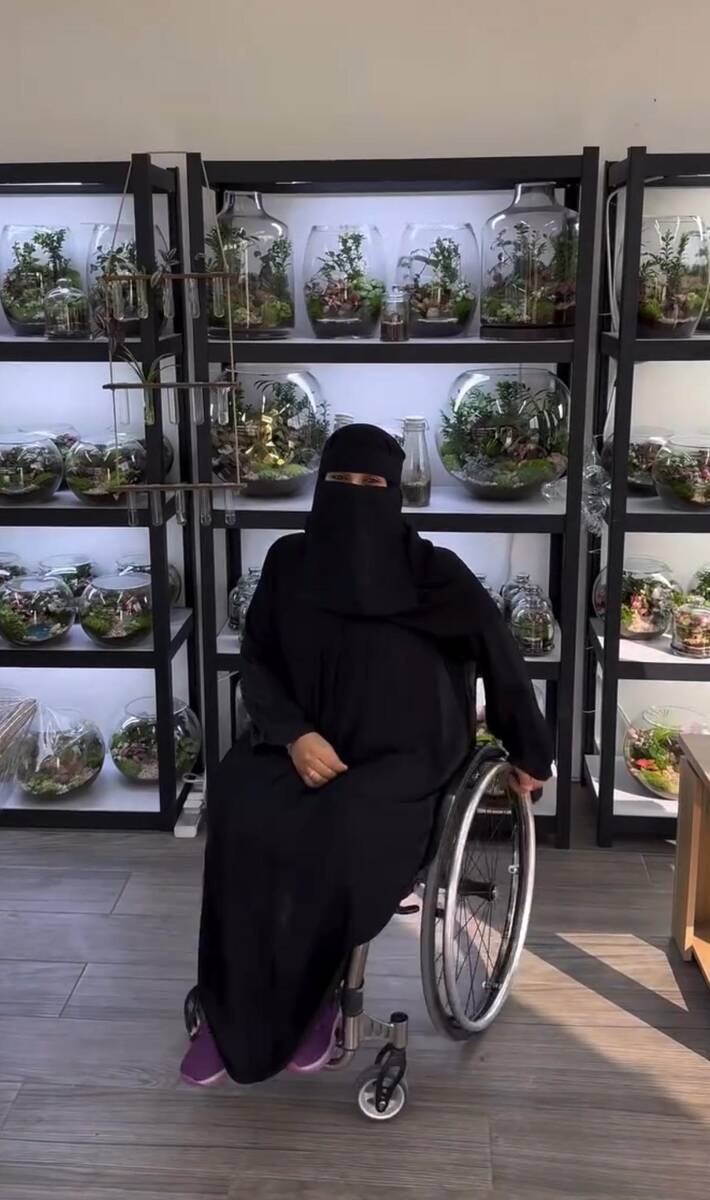RIYADH: In Saudi Arabia’s eastern oasis city of Al-Ahsa, Safeya Al-Khalifa, owner of the terrarium store My Garden, crafts miniature worlds inside glass bowls.
These self-sustaining terrariums thrive in confinement, echoing Al-Khalifa’s resilience in overcoming her physical disability and societal restraints.
“These are tiny, self-sustaining universes nestled within ours,” she told Arab News, cradling a sealed ecosystem where moss blankets the soil and succulents reach toward softened light.
“Terrarium-making isn’t just art; it’s creating life cycles. Like Earth, these worlds maintain themselves. Some need water just once a month, or even less.”
Terrarium globes, shimmering orbs that adorn many homes and offices, harness a delicate balance of biology and physics to sustain miniature ecosystems.

“This isn’t about me – it’s about a system that doubts the capabilities of people with disabilities,” Safeya Al-Khalifa says. (Supplied)
Inside their sealed glass walls, a self-regulated water cycle prevails: moisture evaporates from soil and foliage, condenses into droplets on the curved surface, and trickles back to nourish plants — an elegant loop mimicking Earth’s natural hydrology.
Decades ago, a school refused to enroll Al-Khalifa as a child, saying her wheelchair was a hindrance.
The rejection laid bare a truth she vowed to undo. “This isn’t about me — it’s about a system that doubts the capabilities of people with disabilities,” she said, her tone unwavering.
Society frames disability as a “sickness” or weight, she argued, a mindset that breeds its limitations. To rewrite that story, Al-Khalifa turned to terrarium-making, a craft demanding meticulous care and unshakable belief.
“It starts with blending soils for the right texture and choosing plants suited to each tiny world,” she said. Her terrariums vary in size and theme, depicting diverse terrains such as misty forests, rugged mountainous landscapes, or serene lakesides.
Some pieces take 15 minutes while others can take three days. But the real wonder unfolds as life adjusts. “When a plant moves from the open air into a closed space, it might wilt or shed leaves. But most survive — even flourish.”
For Al-Khalifa, this mirrors her truth: “We’re all shaped to adapt, no matter the odds, if we hold the courage to try.”
The school’s rejection did not faze her — instead it sparked defiance. “That day taught me to find strength in struggle,” she said. That resolve carried Al-Khalifa through years of trial and error with plants, soil and glass.
Terrarium-making became her stance against prejudice: a space where limits only honed her inventiveness. “Every step forward is proof I’ve outgrown another barrier,” she said with a smile.
Key to the survival of these terrariums are humidity-tolerant plants such as Fittonia or Pilea, paired with meticulous design. Layers of gravel and activated charcoal act as a filtration system, wicking away excess moisture to prevent root rot, while indirect sunlight sustains photosynthesis without overheating the enclosed environment.
Al-Khalifa’s vision extends far beyond her studio. “I started this business in 2019 and now I have a whole team of women managing My Garden,” she said with pride.
Together, they have built her passion into a thriving enterprise, collaborating with distribution partners to meet soaring demand. “From our small to large ones, we’ve hit around 8,000 terrariums since we’ve worked with companies that handle orders in the hundreds.”
To those sidelined by society, Al-Khalifa offers no empty comfort, only action. “Awareness must be relentless,” she said.
Prejudices, she said, are learned — not innate. Change begins with presence: “We have to live visibly, so others see we’re simply different, not broken.”
The work is exhausting, Al-Khalifa admitted, but vital. “Only then can old ideas fade, making room for a kinder world.”
Today, Al-Khalifa’s terrariums — sold through her store — grace homes throughout Saudi Arabia, their glass walls misted with the pulse of the life within.
As urban dwellers increasingly embrace low-maintenance greenery, these glass ecosystems symbolize a fusion of art and science — proof that even in confined spaces, nature’s ingenuity can thrive.
Their enduring appeal lies in their simplicity: a self-contained world where life persists, quietly defying the need for constant human intervention.
“This art has no limits,” she said — and neither does she. The plants, Al-Khalifa said, never beg forgiveness for growing where they’re planted. Neither does she.

































